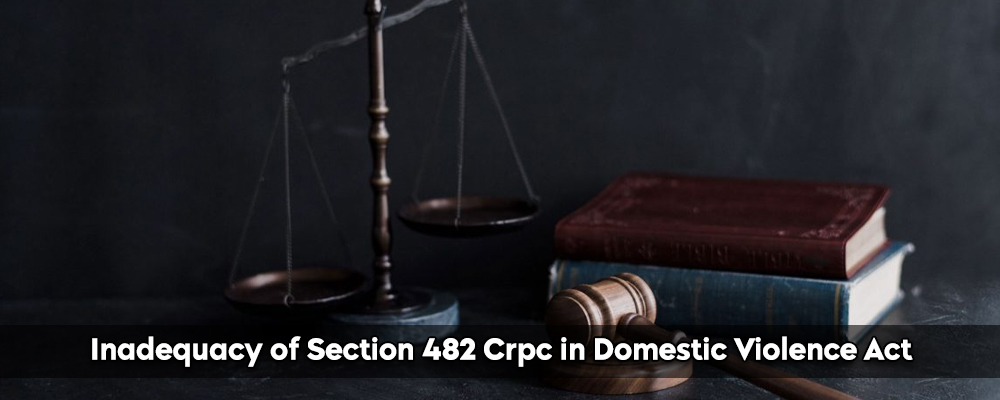The legality of petitions filed under the virtue of Section 482 of the Criminal Procedure Code (CrPC) to contest actions taken under Section 12 of the Domestic Violence Act was the subject of a key decision by the Himachal Pradesh High Court recently. This decision has broad repercussions for people seeking legal redress for domestic violence within the state.
Understanding the Legal Landscape
The Domestic Violence Act serves as a crucial legislation in India, aimed at providing protection and legal remedies to victims, primarily women, who experience domestic abuse. Section 12 of the Act is a significant provision that empowers the court to issue protection orders, restraining the respondent from committing acts of domestic violence and preventing them from disposing of assets used by the victim.
Need A Legal Advice
The internet is not a lawyer and neither are you. Talk to a real lawyer about your legal issue

On the other hand, Section 482 of the CrPC grants inherent powers to High Courts to ensure justice and prevent abuse of legal processes. It has frequently been employed by litigants to challenge various legal proceedings, including those related to domestic violence cases.
Role of Judiciary: Himachal Pradesh HC Decision
In the case of Sanjeev Kumar & ors v Sushma Devi (2023), a division bench of the Himachal Pradesh High Court, comprising Justices Alok Singh and Jyotsna Rewal Dua, ruled that petitions filed under Section 482 CrPC are not maintainable for challenging proceedings initiated under Section 12 of the Domestic Violence Act.
The court emphasized that the Domestic Violence Act contains a specific provision of Appellate remedy under Section 29, which provides for a remedy against orders passed under the Act. By enacting this provision, the legislature has implicitly excluded the application of Section 482 CrPC to challenge proceedings under the Act.
The court further reasoned that the Domestic Violence Act is a welfare legislation designed to protect the rights and interests of victims of domestic violence. It represents a comprehensive legal framework with its own set of procedures and remedies. Thus, allowing parties to circumvent the statutory appellate remedy and utilize the inherent powers of the High Court under Section 482 CrPC would undermine the legislative intent and disrupt the specialized forum established by the Act.
Inadequacy of Section 482 CRPC for Domestic Violence Act Challenges
The inadequacy of Section 482 CrPC for Domestic Violence Act challenges can be summarized as follows-
Specific Appellate Remedy
The Domestic Violence Act provides for a specific appellate remedy under Section 29. This means that petitions filed under Section 482 CrPC to challenge proceedings under the Act are not maintainable.
Legislative Intent
The Domestic Violence Act is a welfare legislation designed to protect the rights and interests of victims of domestic violence. Allowing parties to bypass the statutory appellate remedy and use Section 482 CrPC would undermine the legislative intent behind the Act.
Comprehensive Legal Framework
The Domestic Violence Act has its own set of procedures and remedies. It establishes a specialized forum to address domestic violence cases. Utilizing Section 482 CrPC to challenge proceedings would disrupt this specialized framework.
Legal Certainty
Following established legal procedures and utilizing the specific appellate remedy provided by the Domestic Violence Act promotes legal certainty and ensures a focused approach in handling domestic violence cases.
Expertise in Handling Domestic Violence Matters
By adhering to the prescribed appellate procedure under the Act, disputes arising from domestic violence cases are addressed within a specialized forum equipped with the necessary expertise in handling such matters.
Conclusion
The recent ruling of the Himachal Pradesh High Court clarifying that petitions filed under Section 482 CrPC are not maintainable for challenging proceedings under Section 12 of the Domestic Violence Act brings forth important considerations. It highlights the significance of following the prescribed appellate remedy under the Act and underscores the specialized approach required to address domestic violence cases effectively.
This decision strengthens the legal framework surrounding domestic violence and reiterates the need to prioritize the well-being and protection of victims. By adhering to the specific provisions of the Domestic Violence Act, the court ensures a focused and comprehensive approach in handling cases, fostering a safer and more supportive environment for those affected by domestic abuse.
You can talk to a lawyer at Lead India for any kind of legal advice. In India, free legal advice online is available. Along with free legal advice online you can ask questions to experts online free in Lead India.



